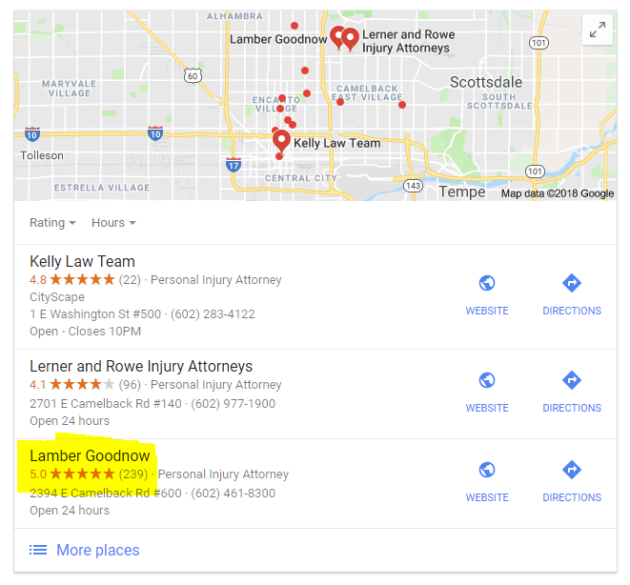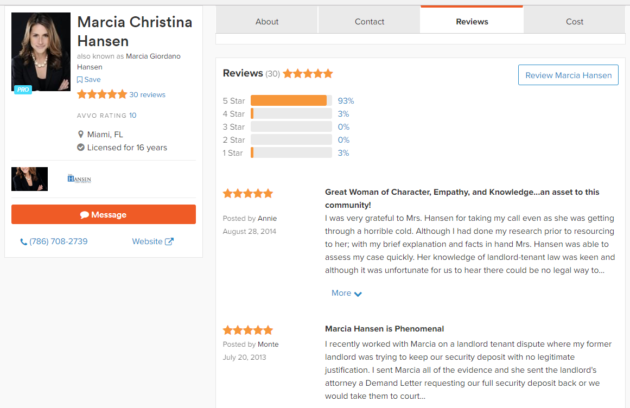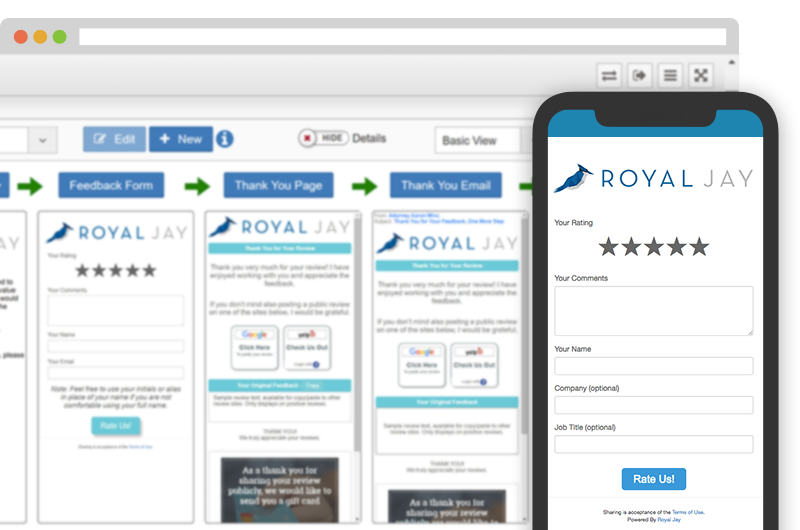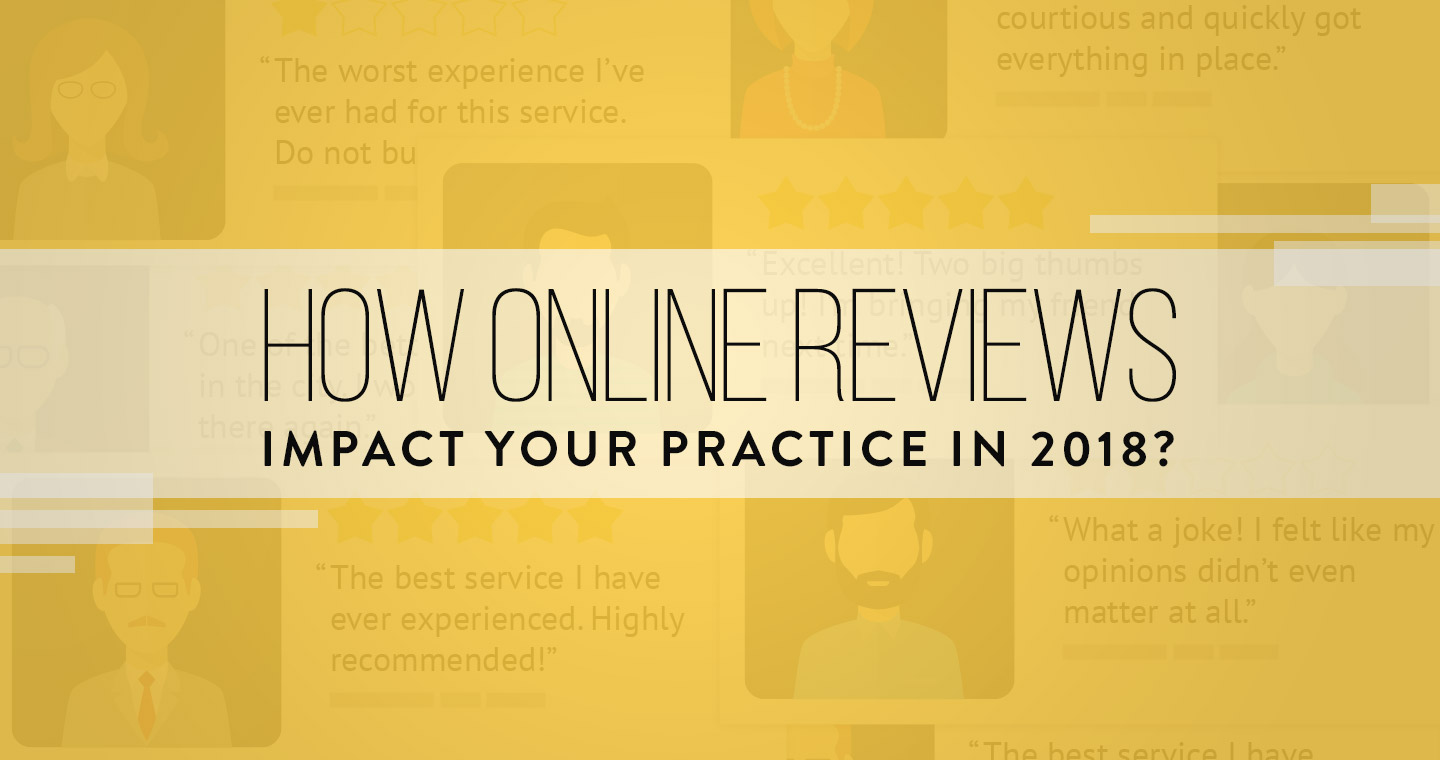For consumers, online reviews and customer testimonials are extremely influential. In fact, 90% of consumers say their purchasing decisions are influenced by reviews.
Online reviews are the most authentic way for your customers to share brand experiences with others in the community.
It’s vital to monitor and properly manage your practices’ online reputation to ensure it is represented accurately on the web.
In this article, I’ll discuss how to:
- Gauge your reputation by monitoring your online reviews and those of your competitors
- Leverage reviews to improve your organic search and conversion rates
- Get more positive client reviews across your top marketing channels (on autopilot)
Online Review Stats: The Good, Bad and Ugly
While online reviews can give you a competitive advantage, they can also send potential customers running to the hills. To help paint the picture, let’s take a look at a few data points:
- A company’s online star rating is the number one factor used by consumers to judge a business
- It only takes six reviews for 73% of your community to form an opinion about your business
- 68% of consumers say positive reviews make them trust local businesses more
- Over half of people aged 18 to 34 say they trust online reviews more than the opinions of friends and family
The importance of positive online reviews is clear. But, how are negative reviews impacting your business?
Short answer: it depends.
Truth is, a 4-star review won’t hurt you. And, some negative reviews can actually make your online reputation look more credible:
- 94% of consumers would use a business with a four-star rating
- 95% of consumers suspect censorship or faked reviews when they don’t see bad scores
- 68% of consumers trust reviews more when they see both good and bad scores
As you can see, it’s not necessary (or even ideal) to have a perfect online reputation. But, if you’re not careful too many negative reviews can hurt your bottom line:
- A single negative review can drive away approximately 22% of customers, whereas around three negative reviews can drive away 59% of the customers
- Have four or more negative articles about your company or product appearing in Google search results? You’re likely to lose 92% of potential customers.
It’s not the end of the world if you get a bad review. The import part is to get more positive reviews than bad ones.
These are broad stats. Let’s take a closer look at the healthcare and legal industries.
How Online Reviews Impact Legal and Health Practices
While reviews are critical to any business, the weighting is especially high in the ultra-competitive legal and healthcare markets. These industries come with high price tags, so consumers will tend to do a lot more research to identify and vet the right service provider.
This increased level of due diligence makes it imperative for lawyers and healthcare professionals to focus on optimizing their online reputation.
The importance of online reviews for healthcare professionals:
- 92% of potential patients read online reviews of their healthcare provider before making an appointment
- 72% of patients searching for a new doctor use online reviews as their first step
- 67% of people say they are influenced by those reviews
The importance of online reviews for lawyers:
- 70% of clients are willing to go to an attorney’s office in a less convenient location if they have better reviews than a nearby legal professional
- 75% of consumers seeking an attorney over the last year used online resources at some point in the process
- 65% found reviews to be extremely influential in their decision
Is Your Online Reputation Give You a Competitive Advantage?
Ever check your online reviews? How about your competitors?
Just showing up in the first position of the organic maps is not enough to generate more leads. Statistically, the public will choose to do business with the practice that has more positive reviews, over the one ranking in the first position.

This is no shock. We all do it. Think about the last time you purchased something on Amazon. Did you buy the first one product listed or look for the best-reviewed product?
Why would it be any different for your customers? These people are about to invest in an expensive service. You bet they are vetting all options. Which brings me to the next question:
What is your community saying about your practice?
Do you keep an eye on your online reputation in real time?
Do you get notifications about bad reviews and respond to it in a timely manner?
The first step in building a winning online reputation – one that differentiates you from the competition and closes customers while you sleep – is setting a baseline.
First, you need to find out where you stand. Second, you need to identify and fix any issues. Third, you need to set up a system that builds more positive reviews across your most important marketing channels. Fourth, you need to respond to negative reviews as they come in, not months after the fact.
If a business resolves its issue quickly and efficiently, 95% of unhappy customers return back to your business
Keep It Simple: Start With Your Top 3 Review Sites
If you don’t have an online presence, start by creating a profile on the most popular review sites in your specific industry.
Claim and fill out your branding on review sites like Google My Business (for Google Maps), Facebook Pages & Yelp. These are the 3 heavy hitters. But don’t forget about the important niche sites.

For the healthcare industry (in no particular order):
- Healthgrades (healthcare reviews for doctors, dentists, and hospitals)
- Vitals (healthcare reviews & info)
- Wellness.com (healthcare reviews & info)
- ZocDoc (it’s like the OpenTable of the healthcare industry)
- RateMDs (Doctor Ratings)
- Oogle (dentist)
- RealPatient Ratings (plastic surgery)
- RealSelf (cosmetic)
Review sites for lawyers and law firms (in no particular order):
Note: All the above sites support most areas of law.
OK, so you’ve set up your profile and are keeping an eye on reviews by using a reputation management system or checking them manually. You should also be responding to any negative reviews that come through in a timely manner.
Great job! You’re keeping a finger on the pulse of your practice.
3 Steps to Building a Winning Online Reputation for Your Practice
But at this point, you’ve only laid the groundwork. To really move the needle and boost your online review ratings and local rankings, you’ll need to focus on the following areas of online reputation management…
#1: Collect reviews from all your clients
Strike while the iron is hot.
To compete against your top competitors, you’ll need to establish a scalable system for collecting reviews from all your clients, during or right after an encounter with your practice. The happy ones and the mad ones. Especially the mads ones!
You might be asking yourself, “why would I want to collect a review from a client that I know didn’t have a good experience with my practice?”
The answer is simple. If you don’t get to them first, they will likely go to a public review site like Google or Yelp and it will be permanent.
Consider using a private review collection system to collect reviews from both happy and unhappy clients. This way, all reviews are private and dealt with discreetly. Give annoyed clients the opportunity to vent in a controlled environment. Since they have been given the opportunity to express themselves they will be much less likely to make it public.
For example:
You could set up an auto response letting the frustrated client know you received their complaint and value the honest feedback. You could customize the message to say your practice is committed to a 5-star experience and a staff member will be reaching out shortly to make things right.
This touch point will make a huge impact on the reputation of your practice. Once an issue is resolved, you will have an opportunity to ask for a positive review – 7/10 people will leave a review if they are asked.

#2: Make it easy to give reviews
Remove barriers by making it dead simple for your happy clients to leave feedback. Here are a few ways to do that:
- Consider collecting feedback in your office using a tablet
- Send out an email asking your clients for feedback
- Use SMS text reminders for appointments
Ok, now its time to discuss what to do with all these new reviews…
#3: Enlarge your review footprint
According to Moz, Online Reviews are now a major signal in Local Search placement.
The key factors are:
- Quantity – how many reviews does your business have?
- Quality – are you getting good reviews from customers?
- Velocity – how often are you getting new reviews?
- Diversity – are reviews coming from a lot of different sources?
- History – do you have a good consistent track record?
So how do you do this? Ask your clients to share!
If you’ve implemented the above steps, you’re now collecting reviews from your clients. You can identify the happy ones.
Ask to share
Reach out to clients and ask them if they will share feedback on one of your public profiles like Google, Facebook, Yelp, or niche sites (mentioned above). Provide a link to the profile(s) to make it easier for them to share their experience. You could even go a step further and provide them with the review they left you as context.
By doing this, the client is receiving an email branded from your practice on their device with a link to your public review profiles. If they click on Google, Facebook or Yelp, they’re most likely already signed in and can easily post a review without having to sign in or sign up. This removes a major obstacle to increasing your online reviews.
Testimonials
Another tactic to amplify the positive reviews you’ve collected is to use them as testimonials on your website (Pro Tip: its important to notify clients that you may use their response on your site at the time of collecting the review and that by leaving the review, they agree to your practice posting their review on the site).
With online reviews being the number one factor used by consumers to judge a business, it makes sense that 50% say a review must be written within one month to be relevant. This highlights the importance of recency in reviews!
These testimonials are an important source of social proof on any home or product/service page. Go an extra step by creating a testimonials page to show your audience the multitude of happy feedback from your clients. Be sure to use both 4 and 5-star reviews to show authenticity.
Schema
Schema micro formatting can be added to testimonials as aggregated reviews so Google can display stars in the search results with your site:

Schema helps the search engine better understand the data on a page. And, it will matter more than ever with the proliferation of voice search. Further, the rich snippets in the search results will help your listing stand out, which will likely result in higher click-through rates and organic traffic.
Behavioral signals like SERP click-through rates, time on page and bounce rate are now becoming heavily weighted ranking factors.
Get social with your reviews
Ever thought of sharing your reviews on social media? It’s a great place to show off how happy your clients are. Share the best ones with your followers. It’s certainly not something you’d want to bombard your audience with but a tasteful post of a selected testimonial can build social proof.
If you want it to show to the public on Facebook, try boosting it to your selected demographic and targeted geographic location. A more advanced tactic would be to leverage reviews in your retargeting ads.

For example:
If someone visits your site without filling out a form, you can serve ads to those people to try and bring them back to your site to convert. Using something like a testimonial carousel featuring your happiest clients is the one of the most powerful ways to do this.
Google will also index reviews from social networks like Twitter.
Ready to Build a Winning Reputation?
Reviews are the most powerful form of marketing for any type of business. Just showing up on the maps isn’t enough.
In a world where consumers are more educated than ever, its critical that your business is positioned as the best service in your market. This reputation can’t be won with your own copy, it’s done through authentic reviews published in the places where your target customer is researching.
To truly take hold of your online reputation, it’s critical to increase the quantity and quality of your online reviews.
Specifically, you need to:
- Monitor your current online reputation: Find where your community is expressing their experiences and respond in a timely manner to the negative feedback
- Collect reviews from all your clients: The good, the bad and the ugly
- Expand your reputation: Ask customers to share their experience online. Add the reviews as testimonials on your site and be sure to include schema micro formatting so the search engines know what to do with it.
If you want to put your online reputation management on autopilot, we can help. The Virayo Reviews Platform will take the stress and confusion out of it so you can do what you do best; run your practice.






